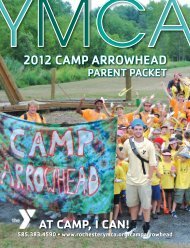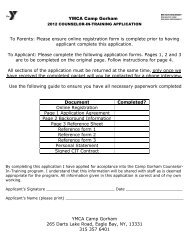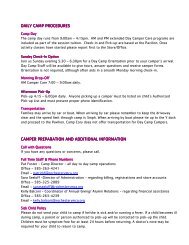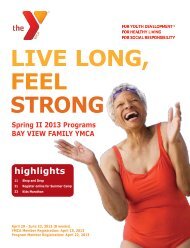2012 Conference Executive Record Report.pdf - YMCA of Greater ...
2012 Conference Executive Record Report.pdf - YMCA of Greater ...
2012 Conference Executive Record Report.pdf - YMCA of Greater ...
You also want an ePaper? Increase the reach of your titles
YUMPU automatically turns print PDFs into web optimized ePapers that Google loves.
material, and there was no certainty that he would attend a later trial date. Also, the defense did<br />
not exercise due diligence in order to guarantee his appearance. Finally, the denial <strong>of</strong> a second<br />
recess was appropriate and did not violate the Appellant’s Constitutional Rights because the<br />
appellant had already been given plenty <strong>of</strong> time to confer with counsel.<br />
ARGUMENT<br />
I. THE TRIAL COURT DID NOT ABUSE ITS DISCRETION IN DENYING APPELLANT<br />
ORTEGA A THIRD ADJOURNMENT TO LOCATE HIS ALIBI WITNESS, NOR DID IT<br />
VIOLATE APPELLANT ORTEGA’S SIXTH AMENDMENT RIGHT.<br />
When reviewing the appropriateness <strong>of</strong> a denial <strong>of</strong> an adjournment request, the appellate<br />
court defers “to the discretion <strong>of</strong> the court, which is consistent with the general rule that the<br />
granting or denial <strong>of</strong> any adjournment by a Trial Judge is a matter <strong>of</strong> discretion.” People v. Foy,<br />
32 N.Y.2d 473, 476 (N.Y. 1973); citing People v. Jackson (111 N. Y. 362); also citing People v.<br />
Oskroba, 305 N. Y. 113, 117.) A trial judge must consider three factors in making the decision to<br />
allow a continuance: “‘(1) that the witness is really material and appears to the court to be so; (2)<br />
that the party who applies has been guilty <strong>of</strong> no neglect; (3) that the witness can be had at the<br />
time to which the trial is deferred.’” People v. Foy, supra at 477; citing King v. D’Eon (1 W.<br />
Black. 510). A review <strong>of</strong> the above cited three prong test in consideration <strong>of</strong> this case clearly<br />
shows that the lower court judge did not abuse her discretion.<br />
(1) Atrion Raimundi is not a material witness. It is obvious that the judge did not believe<br />
the witness was material, as she denied a material witness warrant request. It is a judge’s duty to<br />
consider all possibilities when making decisions on the materiality <strong>of</strong> witness and whether a<br />
subpoena should be issued to ensure their appearance at the court. “The decision whether to grant<br />
an adjournment lies in the sound discretion <strong>of</strong> the trial court, and the exercise <strong>of</strong> that discretion<br />
‘in denying a request for an adjournment will not be overturned absent <strong>of</strong> showing prejudice’.”<br />
People v. Adair, 84 A.D.3d 1752, 1754 (N.Y. App. Div. 4th Dep’t 2011); citing People v.<br />
Arroyo, 161 AD2d 1127, 1127. The judge in this case made her decision regarding Atrion’s lack<br />
34
















